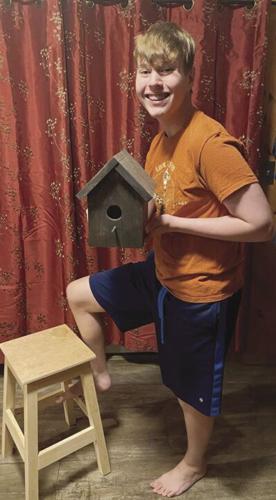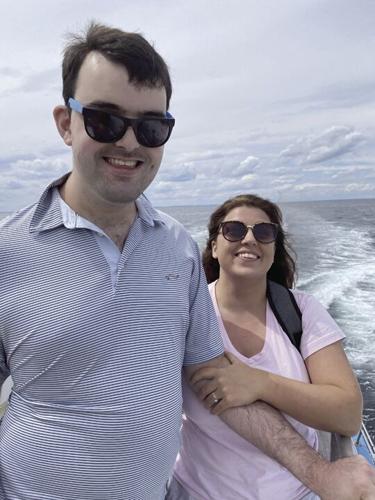NORTHFIELD — The children dictated or printed messages on placemats they made for staff appreciation week at Spaulding Academy and Family Services – a residence and school for young people ages 4 to 21 with neurological handicaps or heart-breaking histories of trauma, or both.
“Thank you for all that you have done and for letting me live here.” “Thank you always being there for me and understanding me when nobody would.” “Thank you for taking care of me and taking me swimming and other stuff.”
Their hand-lettered drawings, encased in plastic, are a feast of gratitude for years spent with more companionship, playtime, guidance and safety than many had ever experienced.
“You saved my life,” Pat Goulet of Manchester told Garrett Lavallee, his favorite mentor and teacher at Spaulding, when he came back to visit. At age 13, Goulet was expelled from public school in Manchester for constant fighting and was referred to what was then Spaulding Youth Center by the juvenile justice system.
“I was always bigger than everybody. I was always getting into trouble. I was a punk, if you will,” said Goulet. Now almost 30, he has a career in manufacturing, a hobby racing cars, and a son about to turn seven, who helps Goulet tinker on the ’87 Chevy Monte Carlo he races at New England Dragway. “I trust Garrett with my life,” Goulet said.
Another Spaulding graduate, Ty, drove from Claremont to Northfield to hug Lavallee on the day his father died. For two years Ty’s dad had driven him to Spaulding every weekday, including in snow, because Ty, who is on the autism spectrum, was afraid to take school transportation.
When Ty was in seventh grade, Lavallee paired him with a nonverbal third grader, whom he mentored for a year – an experience that made him feel that he had something to give and prompted his desire to become a nurse. On Lavallee’s windowsill sits a brightly-colored baseball Ty bought for Lavallee when he visited the Rock and Roll Hall of Fame in Ohio with his dad.
Developing relationships
Thanks isn’t always a word. Sometimes it comes in the form of eye contact or an extra-seconds-long hug, said Lavallee, who has worked at Spaulding for 20 years, and now coordinates special education services.
“Our goal is to have our children feel whole, to be positive and productive members of their communities and be safe. The relationships we have with them are everything.” Going for ice cream, grilling on the beach, taking a break to be silly outside – the small events of childhood make a quilt of memories and a positive map forward.
“It’s secret handshakes and nicknames. It’s all those little things they remember that show you care. Every child deserves a childhood. That relationship, love and care doesn’t stop when they leave,” Lavallee said.
This year, the 500-acre, hilltop residential school and treatment center that began as an orphans' home in 1871 is celebrating its own milestone: 150 years of helping youngsters across New Hampshire. The school helps kids with serious neurological disorders and, increasingly, children in crisis without safe and stable homes. Since 2003, Spaulding has placed 50 to 60 children with emotional and behavior issues stemming for trauma in foster families, and roughly 20 have been adopted by their foster parents, who are trained by Spaulding in how to provide structure and wraparound care.
As a result of the opioid epidemic, a larger number of Spaulding's day students and full-time residents have come from homes with drug-addicted parents – which resulted in their abuse and neglect – and prompted a lack of trust. Others arrive from homes where mentally ill parents are not able to function fully, or provide stability, guidance or regular meals. One 15-year-old boy arrived in diapers, according to Linda Pletch, Spaulding's behavioral programming manager.
“We have a large population that have been severely abused and neglected, and that is growing. It’s horrifying and it’s heartbreaking to read some of their files. No child should have to live like that,” said Pletch. And children are coming at younger ages.
“We have little kids 5 years old in residential treatment who have had so much trauma at this point their survival skills aren’t what society expects,” said Carol Sanborn, who has worked at Spaulding for 36 years and now serves as quality assurance coordinator. Some little ones compulsively steal, hide soiled bedding or clothes, and hoard food because they never knew when their next meal would be. “Some know more swear words than you thought were ever possible because of what they were exposed to. Everything is a learning lesson for these poor kids. You think, ‘How could that kid get up another day with the experiences they were having?'”
“From day one, you have to establish yourself as a positive person in that kid’s life, so when you walk through the door, the kids are excited to see you enter,” Pletch said.
With increasing pressures in society resulting in fallout or tragedies for children, Spaulding has an expanding mission – a healing purpose that hinges on establishing a sincere connection, a conduit of love and trust. That especially holds true for young people with neurological deficits that make it difficult for them to leave home. Some dedicated parents, after years of trying, send their severely handicapped children to Spaulding for training and support they can’t provide, and the result can be life-changing.
Lasting bonds
At age 26, Robbie Parker is still mostly nonverbal.
But before COVID temporarily closed his venues for social interaction, his life was a tapestry of art, music and theater, dances and dinners, and working as a volunteer, cleaning a church – a schedule his family hopes will resume.
Despite his neurological disabilities from Syngap-1, a genetic mutation that causes autism, Parker lives in Derry in his own home, with another disabled adult male and three support workers who take day and night shifts helping them with daily living. Parker also receives physical and occupational therapy.
Every other weekend, he visits his mother in Hampton Beach, where they walk beside the surf and reminisce about their vacations at Disney World, including a trip with Kerrin Gullison, his favorite staff member from Spaulding. Whenever he sees the lights of Bernie’s, a tiki bar that reminds him of Florida, Parker shouts, “Steve! Nate! Pete!” – the names of the three "stick men" who walked on stilts in the Downtown Disney town square.
“It couldn’t be better. I’m so blessed. I’m so fortunate that he can be happy,” said his mother Susan, who remembers scary incidents when her son was a child at home. “After he went to Spaulding he only hit me once.”
Before he started attending Spaulding at age 16, the notion of going to school brought outbursts, bouts of kicking furniture and toppling the television. The school bus driver routinely walked him from his front door to the bus at the foot of the driveway.
Thanks to five years of training in emotional control, classes tailored to his cognitive abilities, and outdoor activities that helped him release stress and build camaraderie with other people, Parker is not the volatile, aggressive or unyielding teenager who entered Spaulding. And Susan has learned how to redirect repetitive thoughts that still make him agitated as an adult.
But more than any one class or activity group, it is his lasting bond with Kerrin Gullison that changed Parker’s emotional life. Parker has a memory for everything meaningful, including people.
Photos show Parker at Kerrin’s wedding, kissing the glowing bride. This past summer, Kerrin went on a whale watch with Parker and his mom. It’s a relationship that continues, enriching the lives of both. “She’s part of the family,” Susan said. "They're best friends."
Learning to cope
Young children and teens come to Spaulding with varying levels of autism or other neurological disabilities. Some are nonverbal with limited social and self-care skills. Others are highly communicative and have slight nuances of behavior that hamper their acceptance by peers, and are rigid in their thinking – which requires training in flexibility. Most have short attention spans, low tolerances for frustration and aggressive behavior, and some injure themselves, Pletch said.
At Spaulding they learn coping skills and relaxation techniques such as deep breathing, visualization and taking a walk outside, or sitting on a bean bag and listening to music. Some put their heads down on their desks. Others have weighted blankets. They learn to recognize triggers, such as noisy, chaotic places, so they can avoid them or remove themselves from the situation.
“Their sensory systems are unique,” said Pletch. “Simple noises will escalate them, and they’re not able to recognize it or what to do to calm themselves.”
Many act out because they need to eat or drink or use the bathroom, discomforts they can’t easily convey. Some learn to use LAMP, a tablet with visual icons that releases a spoken statement when pressed like keys on a screen.
“A lot of kids don’t know how to say, ‘I need a sandwich.’ They become aggressive because they don’t feel well and don’t know how to communicate that,” said Pletch. Communication increases with steady, secure relationships; these relationships are “absolutely critical. The kids do best with certain staff, with certain personality types. They want to have someone who’s going to value them and have fun with them.”
A range of abilities
That's also true for higher-functioning children who come to Spaulding.
Kyle Harcrow, 17, now lives with his mother in Goffstown after living at Spaulding in 2013 and 2014. He started there at age 9 when he was referred by the court system for aggressive behavior. He went back as a day student from 2015 to 2017.
“I was aggressive and physical. At first I was sad and didn’t want to leave my mom and my sister. I started to warm up and feel like it was a second family there,” he said.
Today he is a junior at Goffstown High School, studying carpentry at Manchester School of Technology. He is proud of what he has been able to accomplish during his first year in the vocational-technical program: A bird feeder for his mother, a shelf for her night stand, and a corn hole set for his sister – projects that developed construction skills he hopes eventually to use as a house framer.
“I was happy and excited to see their reaction,” Kyle said.
When he thinks about Spaulding, he remembers the staff who built him up when he saw little value in himself: “Nick and Charlie and Garrett. When I went there, I felt I had no one supporting me. They made me feel wanted. They were like brothers. They welcomed me with open arms. They helped with me with my homework. They helped me tie my shoes. They helped me learn new coping skills. When I was down, they made me smile with a joke or something.” They also played basketball and board games and watched movies together.
“They would gently harass him in a brotherly way, and say things like, ‘Are you going to brush your hair today, or are you going to go out looking like a mop?’ That made it feel like things were normal,” said his mother, Kim Wade. “They were always there to talk when he was having a hard time.”
At Spaulding, Kyle met kids with similar behavioral issues and sensory deficits who he could relate to as peers. “I feel like it changed me,” he said. “It made me more open-minded to different people.”
Lavallee said that whatever hardships or obstacles a child has experienced, it's important to build compassion and patience. When he analyzes his mentoring relationships, and focuses on what catalyzes change for the broadest range of youngsters, one ingredient rises to the top.
Relationships are enhanced by playing together, but trust is primarily built through listening, and trust forges love. “If a kid’s sitting there and they start to open up and I say, ‘I know what you mean,’ that’s not true. I was never abused. I never experienced homelessness or neglect,” Lavallee said. “But what I can do is listen and spend time with them. Over time, they start sharing more.”




















(0) comments
Welcome to the discussion.
Log In
Keep it Clean. Please avoid obscene, vulgar, lewd, racist or sexually-oriented language.
PLEASE TURN OFF YOUR CAPS LOCK.
Don't Threaten. Threats of harming another person will not be tolerated.
Be Truthful. Don't knowingly lie about anyone or anything.
Be Nice. No racism, sexism or any sort of -ism that is degrading to another person.
Be Proactive. Use the 'Report' link on each comment to let us know of abusive posts.
Share with Us. We'd love to hear eyewitness accounts, the history behind an article.